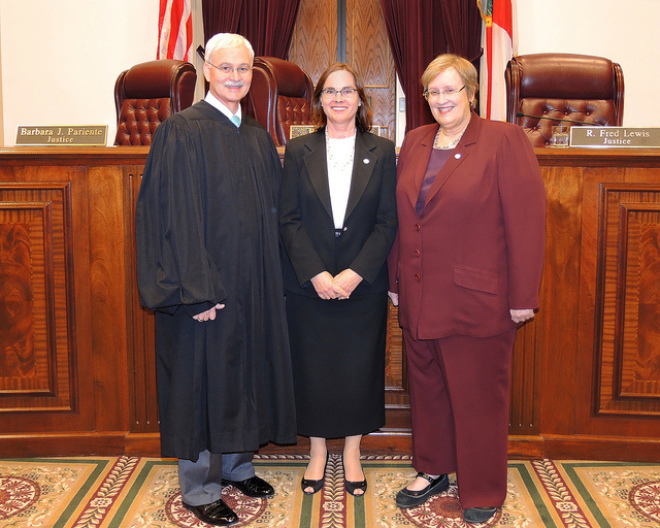The Smiling Faces of Evil
Portrait of Injustice and Corruption
We are above the law. We answer to no one.
The Smiling Faces of
Evil
Thirteenth Judicial Circuit Judge Claudia Rickert Isom received the Distinguished Judicial Service Award while a Respondent in Petition No. 12-7747 for writ of certiorari to the Supreme Court of the United States. The Thirteenth Judicial Circuit was also a Respondent No. 12-7747
The award was given to Claudia Isom to rehabilitate her image. The Florida Bar’s announcement notes, "As a jurist, Judge Isom is not permitted to participate in direct pro bono legal services; however, she is still committed to pro bono work and giving back to the community."
The award was presented to Isom January 31, 2013, more than 2 weeks before a decision was rendered in Petition No. 12-7747. This early confidence suggests Ricky Polston et al. knew the outcome of my petition well before the U.S. Supreme Court Conference on February 15, 2013.
In addition, Florida Solicitor General Timothy Osterhaus failed to appear in Petition 12-7747 on behalf of Florida Attorney General Pam Bondi to represent the State of Florida before the U.S. Supreme Court. The Attorney General also failed to file a waiver to respond to the petition.
Certainly Ricky Polston, Claudia Isom, and Gwynne Young knew only the Attorney General of Florida may represent the State of Florida in a federal court action. [Art. IV, § 4(b), Fla. Const., F.S. § 16.01(5), and State ex rel. Shevin v. Weinstein, 353 So. 2d 1251 (Fla. Dist. Ct. App. 3d Dist. 1978)].
Yet none of them objected when Attorney General Bondi let Ryan Christopher Rodems be the only Respondent to file a waiver of the right to file a response to the petition. Mr. Rodems is a lawyer in private practice who’s firm stole $7,143 from my settlement in the Amscot case, and is the basis for the petition.
The Supreme Court docket for Petition No. 12-7747 shows the proceedings and orders:
- Aug 13 2012 Application (12A215) to extend the time to file a petition for a writ of certiorari from October 11, 2012 to December 10, 2012, submitted to Justice Thomas.
- Sep 13 2012 Application (12A215) granted by Justice Thomas extending the time to file until December 10, 2012.
- Dec 10 2012 Petition for a writ of certiorari and motion for leave to proceed in forma pauperis filed. (Response due January 14, 2013)
- Dec 20 2012 Waiver of right of respondents Rayan (sic) Christopher Rodems; and Barker, Rodems & Cook, P.A. to respond filed.
- Jan 24 2013 DISTRIBUTED for Conference of February 15, 2013.
- Feb 13 2013 Supplemental brief of petitioner Neil J. Gillespie filed. (Distributed)
- Feb 19 2013 Petition DENIED.
- Mar 18 2013 Petition for Rehearing filed.
- Mar 27 2013 DISTRIBUTED for Conference of April 12, 2013.
- Apr 15 2013 Rehearing DENIED.
Also see the following documents:
- Letter to Mr. Alberto Pimentel, Storbeck/Pimentel & Associates, Inc., with authentication of the photograph by Beth C. Schwartz, Court Publication Writer, OSCA.
- Petition No. 12-7747 for writ of certiorari, Supreme Court of the United States.
- Index to Petition No. 12-7747; 2012 Rule 13.5 Applications; 2011 Rule 22 Applications.
- Orders and letters from the Supreme Court of the United States, Petition No. 12-7747.
- Judicial Immunity vs. Due Process, by Robert Craig Waters, Cato Journal.
“In the American judicial system, few more serious threats to individual liberty can be imagined than a corrupt judge. Clothed with the power of the state and
authorized to pass judgment on the most basic aspects of everyday life, a judge can deprive citizens of liberty and property in complete disregard of the Constitution. The injuries inflicted may be
severe and enduring. Yet
the recent expansion of a judge-made exception to the landmark Civil Rights Act of 1871, chief vehicle for redress of civil rights violations, has rendered state judges immune from suit even
for
the most bizarre, corrupt, or abusive of judicial acts.’ In the last decade this “doctrine of judicial immunity” has led to a disturbing series of legal precedents that effectively deny citizens
any
redress for injuries, embarrassment, and unjust imprisonment caused by errant judges....”
Judicial Immunity vs. Due Process: When Should A Judge Be Subject to Suit? Robert Craig Waters, Cato Journal, Vol.7, No.2 (Fall 1987). The author is [was] Judicial Clerk to Justice Rosemary Barkett of the Florida Supreme Court.
UPDATE February 18, 2015. Read more on my blog.
Supreme Court records obtained show certain pleadings, letters and other documents filed in Petition No. 12-7747 were received by the Supreme Court January 24, 2013 (date stamped Received, Jan 24 2013 Office of the Clerk, Supreme Court, U.S.). But those pleadings, letters and other documents do not appear on the Supreme Court’s docket for Petition No. 12-7747.
Supreme Court records were provided by the National Archives and Records Administration, and researcher Mark Leutbecker, Nicklason Research Associates.
Therefore a reasonable person could conclude that U.S. Supreme Court Petition No. 12-7747 was compromised. A reasonable person might also conclude that the compromise of Petition No. 12-7747 was due to "a special relationship with the Chief Justice of the Untied States" with former Florida Chief Justice Ricky Polston, Thirteenth Judicial Circuit Judge Claudia Rickert Isom, and former Florida Bar President Gwynne Alice Young.
UPDATE January 21, 2015. Read more on my blog.
On information and belief, the foregoing is evidence of misconduct by former Chief Justice Ricky Polston, Judge Claudia Rickert Isom, and Florida Bar President Gwynne Alice Young. Presenting Claudia Isom the Distinguished Judicial Service Award while Isom was a Respondent in Petition No. 12-7747 for writ of certiorari to the Supreme Court of the United States, along with the Thirteenth Judicial Circuit, is conduct unbecoming a member of the bar that is prohibited by Rule 46 of the Federal Rules of Appellate Procedure because it implied "a special relationship with the Chief Justice of the Untied States".
In determining what conduct violates Rule 46, an earlier Supreme Court [In re Snyder 472 U.S. 634, 645 (1985)] found tribunals should consider "case law, applicable court rules, and ‘the lore of the profession,’ as embodied in codes of professional conduct," such as the ABA Model Rules of Professional Conduct.
Judge Isom's appearance January 31, 2013 in the Florida Supreme Court Chamber violated, inter alia, Rule 8.4(e) of the Model Rules, which
says it is professional misconduct for an attorney to "state
or imply an ability to influence improperly a government agency or official or to achieve results by means that violate the Rules of Professional Conduct or other law."
The Distinguished Judicial Service Award itself appears to be a sham anyway. Officially the award "honors outstanding and sustained service to the public especially as it relates to support of pro bono legal services". But for the past three years the award was given to judges or a spouse who in my Hillsborough case denied me basic due process.
In 2012 Judge James M. Barton, II,
got the Distinguished Judicial Service Award, presented by the Chief Justice Polston in the Supreme Court. Barton presided over my case in Hillsborough
County (05-CA-7205) from February 13, 2007 through May 25, 2010. The record shows Barton collaborated with Mr. Rodems and my lawyer Robert W. Bauer (a Bar referral) to undermine my
case. On January 13, 2006 I established by Order of Judge Nielson a cause of action against Rodems and his firm in the theft of $6,224.78 ($7,143) through a closing statement fraud. My
motion and affidavit for summary judgment were filed April 25, 2006 and noticed for hearing. Tellingly Bauer did not argue my summary judgment. Instead he assisted Rodems &
Barton.
In 2013 Judge Claudia R. Isom got the Distinguished Judicial Service Award, presented by the Chief Justice Polston, see attached. Isom presided over my case in Hillsborough County (05-CA-7205) from November 22, 2006 through February 13, 2007.
In 2014 Judge Emily Peacock got the Distinguished Judicial Service Award, presented by the Chief Justice Polston at a Jan. 30 ceremony at the Supreme Court of Florida. Emily Peacock is married to Mike Peacock, the Public Defender who failed to represent me June 1, 2011 after he was appointed to do so. Judge Arnold relieved the public defender from the counsel appointment claiming no basis. But Arnold had other basis to appoint counsel, including the ADA, and under Fla. Stat. § 29.007 (2011) "This section applies in any situation in which the court appoints counsel to protect a litigant’s due process rights.", according to the ABA.
































































































































